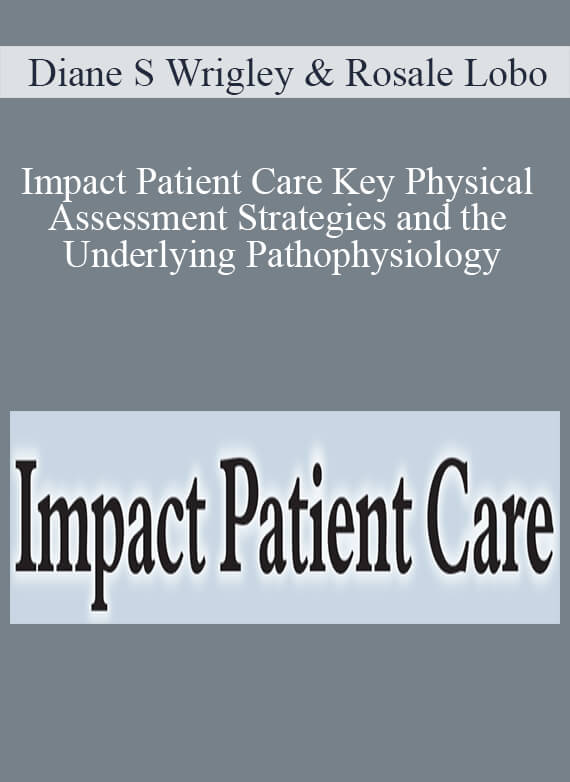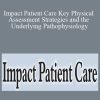Diane S Wrigley & Rosale Lobo – Impact Patient Care Key Physical Assessment Strategies and the Underlying Pathophysiology
$149.00 Original price was: $149.00.$44.00Current price is: $44.00.
Digital Download: You will receive a download link via your order email
Should you have any questions, please contact us: [email protected]
 Diane S Wrigley & Rosale Lobo – Impact Patient Care Key Physical Assessment Strategies and the Underlying Pathophysiology
Diane S Wrigley & Rosale Lobo – Impact Patient Care Key Physical Assessment Strategies and the Underlying Pathophysiology
Are you missing vital clues during physical assessments?
What separates nursing from other specialties is our ability to assess for signs and symptoms of disease. But physical assessment exams can be disjointed, confusing, and overwhelming.
In this self-paced online course, top experts will guide you step-by-step through the physical assessment and underlying pathophysiology. You’ll walk away with an orderly way to do physical assessments, so you don’t lose the flow or forget steps. It’s quick, it’s neat, it’s concise, and it’s very complete.
- Listen to normal and abnormal heart and lung sounds and step through the origin and significance of each sound
- Learn methods to properly document your assessments and findings
- Discover tricks to simplify your nursing diagnostic skills
- Revitalize your clinical competence and master challenging disease facts
- Earn up to 14.5 CE Hours, including 3.0 ANCC-approved pharmacology credits
Expectations are high, and every detail matters. Take the fear out of assessments with this information-packed course — work at your own pace to boost your skills, gain confidence, and make good assessments.
Here’s what you’ll get in this comprehensive online course:
As an experienced healthcare professional, you see disease and injury all the time. The underlying cause of the presenting symptoms or complications can shed critical insight in the delivery of patient care. And that is why the backbone of pathophysiology understanding is so essential.
Join Angelica Dizon, MD, MSN, MBA-HCM, BSN, RN, NP-C, an advance care practitioner with decades of clinical experience, for her easy-to-implement pearls that will help you grasp pathophysiology at a truly advanced level.
Plus, earn 3.0 ANCC-approved pharmacology credits!
- Evaluate clinical examples to explain the statement: “Virtually all human disease is ‘autoimmune’ in nature”
- Plan for the self-destructive spiral of progressive chronic heart failure
- Apply the “Three Question Approach” to interpretation of arterial blood gases
- Distinguish the “common mechanism” for shock, regardless of the initial cause
Identify Cardiac, Respiratory and Neurological Disorders
Learn to identify the different variants in the cardiac, respiratory and neurological assessments. National speaker and expert, Diane Wrigley, BS, PA-C, will teach you the origin and significance of both abnormal and normal heart and lung sounds.
Differential diagnoses are considered, and a systematic six-part neurological assessment is reviewed and demonstrated for you.
Case studies will be presented for discussion to help reinforce the physical assessment skills and listening techniques. Diane will also illustrate the proper methods to document your assessments and findings. You will feel confident leaving this seminar with information you can utilize for your future patient assessments.
- Strategies to detect and identify abnormal heart and lung sounds
- Case Studies and audio playback to enhance learning
- Crackles, wheezes, rubs, gallops, clicks and snaps
- Full disclosure and how this leads to proper differential diagnoses
- Characteristics and causes of heart murmurs
- Complete 6-part neuro exam made simple — exam will be demonstrated
- Discussion and work-up for mental status changes
Sale Page: https://catalog.pesi.com/sales/hc_001155_physassesspatho_organic-11137
Archive: https://archive.fo/wip/by71g

![[Download Now] Impending Doom: Crisis Prevention and Management in the Deteriorating Patient – Rachel Cartwright-Vanzant](https://imc.sale/wp-content/uploads/2022/02/Impending-Doom-Crisis-Prevention-and-Management-in-the-Deteriorating-Patient-–-Rachel-Cartwright-Vanzant-100x100.jpg)
![[Download Now] Igniting Neuroplasticity after Stroke: Breakthroughs for Improving Motor Recovery – Michelle Green](https://imc.sale/wp-content/uploads/2022/02/Igniting-Neuroplasticity-after-Stroke-Breakthroughs-for-Improving-Motor-Recovery-–-Michelle-Green-100x100.jpg)


8 reviews for Diane S Wrigley & Rosale Lobo – Impact Patient Care Key Physical Assessment Strategies and the Underlying Pathophysiology
There are no reviews yet.